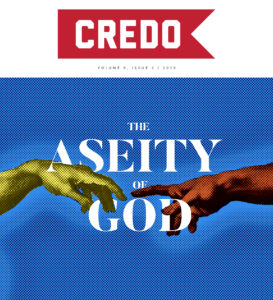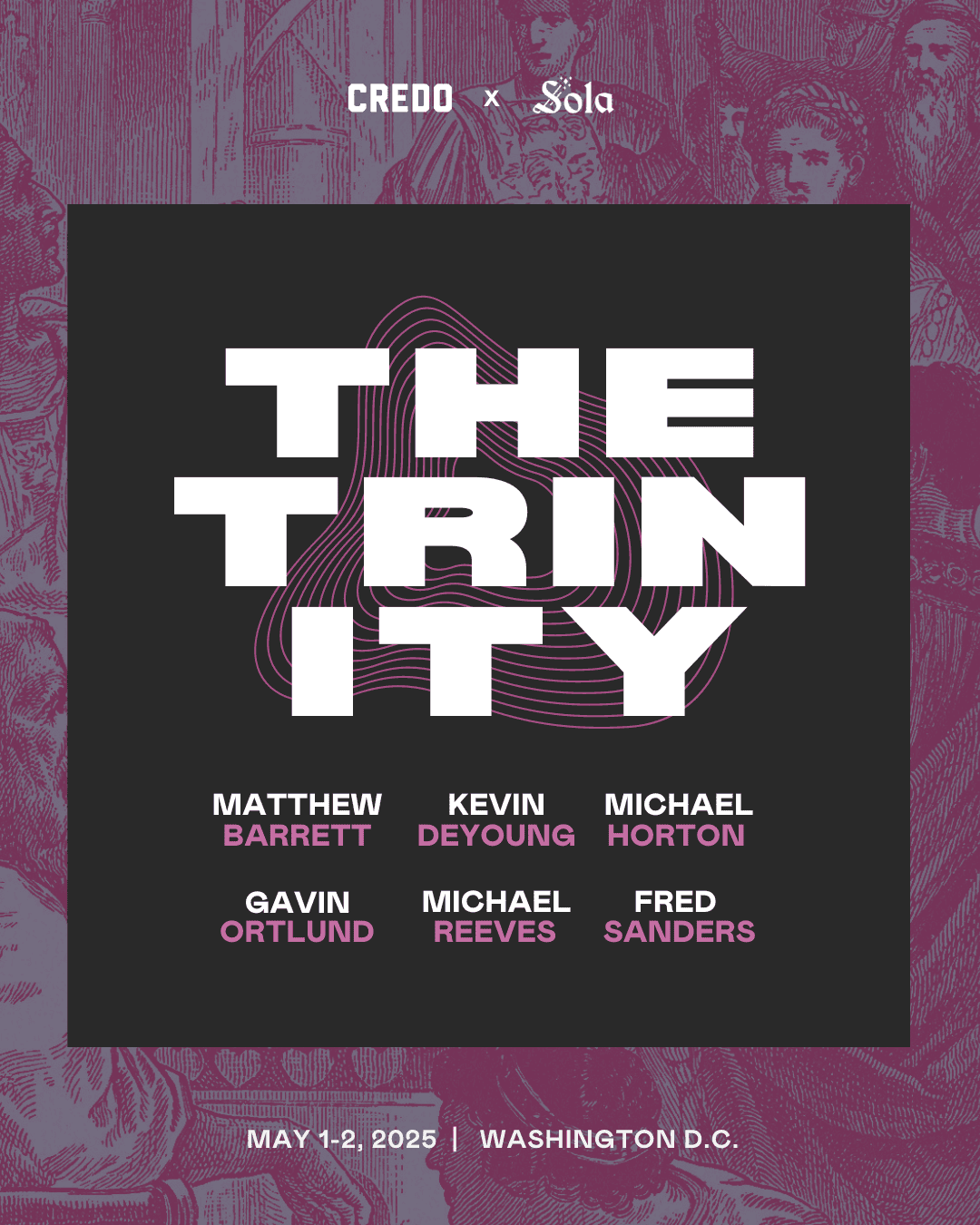The Old Testament is a polemic text, written in a particular cultural context to set right the wrong views its readers held about God and humanity. Of these wrong views, perhaps none had more significant implications than the view that God was fully existent in and of himself and dependent upon no person or thing for his existence. On the flipside of that, humans do not exist except apart from the creative processes and sustaining work of Yahweh, God of heaven and earth.
God’s Counter-cultural Aseity as Creator
The creation narrative in Genesis 1–2 lays out this distinction between God and humans clearly. I’m sure you’re familiar with the gist of the passage. In the beginning only God existed, and he created all things by his very word. The skies, the land, the seas, plants, animals, bugs, fish, and finally humans. All of this, God did in and of himself—the Triune God working within himself to create out of nothing the whole of everything. This picture of the singular God creating all things by his word contrasts sharply with the competing creation accounts in the Israelite context. Furthermore, in Genesis 1–2 humans are created by God in order to live in relationship with him. They are placed in a garden, a cosmic temple, in order to care for God’s creation and to mimic his creative work. Adam and Eve bore God’s image—they represented his rule and reign in their care over creation.
Ancient Near Eastern creation accounts present a starkly different picture of creation. For example, in the Sumerian Eridu Genesis, three gods created the Sumerian people and the land where they lived. There exists in the biblical worldview no pantheon of which God is part. He alone is God, and he alone is creator and therefore ruler over all things. Share on X In Egypt, several creation stories competed with one another, but all agree that the world arose out of the chaotic sea, and all agree that more than one god or goddess was at work in creating. In none of these narratives does a singular God create all things by spoken word. And in the Akkadian Atrahasis Epic, more powerful gods conscripted less powerful gods to do the hard work of creating waterways while the more powerful gods built mountains and dug out the Tigris and Euphrates. Once these lower gods became disillusioned with the hard labor placed on them, they hatched the idea to create humans to do the work they no longer wanted to do. What resulted was a battle for the ages, with one god eventually being killed and humans created from a mixture of clay and that god’s blood. Thus, humans were created and the lower gods no longer had to care for the higher gods:
I have done away with your heavy forced labor,
I have imposed your drudgery on man.
You have bestowed clamor upon mankind.
I have released the yoke, I have made restoration (Atrahasis Epic, lines 240–244).
If this is the cultural milieu in which the Israelites found themselves, then the biblical view of God’s creative work had significant implications for how God’s people viewed both themselves and their God. First, the God of the Bible is the only God. There exists in the biblical worldview no pantheon of which God is part. He alone is God, and he alone is creator and therefore ruler over all things. There was no battle in the heavens that resulted in the creation of humans or any other thing. And there were no less-powerful gods who were conscripted into forced labor. No, the God is Israel is the singular, all-powerful God who created all things.
God’s Aseity and the Creation of Man
Second, and most importantly for understanding the importance of God’s aseity, along with how radically counter-cultural such a concept was in the ancient Near East, God did not create humans because of some lack in himself. That is, since God is self-existent, he is fully complete in and of himself and relies on no other thing for his own existence. Compare this with the Atrahasis Epic, along with the broader ancient Near Eastern understanding of humanity’s relationship with their gods. In Atrahasis, people are created to do the work the gods no longer want to do—the basic work needed to provide for the gods’ needs. Likewise, the overall sacrificial system was thought to be a way to provide for the needs of the gods. That is, the gods themselves needed the people to sustain them with food and drink. This is why proper ritual and sacrifice were so important—if the gods’ needs were not met or they were angered for some reason, then they would retaliate against their worshipers by bringing some sort of calamity upon them, such as famine or military defeat.
The biblical God, though, has no such need. He does not need humans to feed him or give him water to drink. Humans are fully contingent upon God, and God is the only necessary being. The effect of such a change in worldview (from the idea that humans are necessary to the idea that God alone is necessary) had a remarkable impact on God’s people, and it had the potential to set free those held in slavery to idolatry. Rather than being created to meet the needs of the gods, the true story that Genesis 1–2 tells is that God created humans out of his goodness for the purpose of imaging him and living in right relationship with him. A right view of God’s self-existence, then, frees humans to be fully human and to fulfill the purpose for which they were created. It is a remarkable thing to realize that we were not made so that we could keep our gods alive, but rather we were made so that we could bear God’s image.
Freedom comes from believing the truth about who humans are and who God is. God is necessary; we are contingent. This becomes even more clear in the next book of the Pentateuch: Exodus. There, Moses asked God, “If I go to the children of Israel and I say to them, ‘The God of your ancestors sent me to you,’ and they say, ‘What is his name?’ What shall I say to them?” God responded by revealing a core reality of his nature: “I am who I am. Therefore say to the children of Israel, ‘I am sent me to you’” (Exod. 3:13–14).
The significance of this statement can be lost on English readers, who are used to seeing sentences with some form of the “to be” verb. Hebrew writers, comparatively, use the “to be” verb rarely. In most cases where we read “is” or “are” or “were” or “was,” the Hebrew form is actually a verbless clause—two nouns next to each other that require a verb in English translation but not in Hebrew. Exodus 3:14 uses the Hebrew verb of being, that is, the “to be” verb. So, we must understand this self-revelation of God as more than saying, “I am a person” or “I was there” or “He is nice.” Each of these last three examples would be verbless clauses in Hebrew—they would not have the “to be” verb. Thus, in this statement God is declaring that he exists. His very essence, his being, who he is, is existence. Humans are not existence itself. God is. And that reality is what makes folks like Elijah and Isaiah mock idols and idolaters. God's very essence, his being, who he is, is existence. Share on X
God’s Aseity and False gods
At Mount Carmel the prophet Elijah challenged 450 prophets of Baal to a duel of sorts. Each side would build an altar to its G/god, sacrifice on it, and stand back while the G/god demonstrated his existence. Predictably, for us at least, no fire lighted Baal’s altar: “Cry aloud, for he is a god. Either he is musing, or he is relieving himself, or he is on a journey, or perhaps he is asleep and must be awakened,” said Elijah (1 Kgs. 18:27 ESV). In fact, Baal is nonexistent. He is a god who has no being, no essence; he is not. Yahweh, though, is the God who exists, the God whose very essence is that he exists. And that existence is in no way contingent upon Elijah’s, or anyone else’s, sacrifice.
Similarly, Isaiah made fun of idols and their worshipers:
The ironsmith takes a cutting tool and works it over the coals. He fashions it with hammers and works it with his strong arm. He becomes hungry, and his strength fails; he drinks no water and is faint. The carpenter stretches a line; he marks it out with a pencil. He shapes it with planes and marks it with a compass. He shapes it into the figure of a man, with the beauty of a man, to dwell in a house. He cuts down cedars, or he chooses a cypress tree or an oak and lets it grow strong among the trees of the forest. He plants a cedar and the rain nourishes it. Then it becomes fuel for a man. He takes a part of it and warms himself; he kindles a fire and bakes bread. Also he makes a god and worships it; he makes it an idol and falls down before it. Half of it he burns in the fire. Over the half he eats meat; he roasts it and is satisfied. Also he warms himself and says, “Aha, I am warm, I have seen the fire!” And the rest of it he makes into a god, his idol, and falls down to it and worships it. He prays to it and says, “Deliver me, for you are my god!” (Isa. 44:12–17 ESV)
Isaiah points out the absurdity of those who worship the gods they build. Their contingency is built into the fabric of who they are, and this foolishness should be apparent to everyone, and yet it wasn’t. The Israelites struggled with idolatry since Aaron built the calf in Exodus 32, and here in Isaiah the people are about to be exiled for their continued reliance on the gods who are not gods. These “gods” rely on people for their existence, and so they obviously (to Isaiah, at least) have no power to save them from the pending exile, or anything else, for that matter. The contingency of idols is the clearest evidence that they are not gods at all and that those who worship them are foolish.
Utterly Reliant on God
God’s aseity, then, had clear implications for the audience of the Old Testament, and those implications remain significant for Christians today. Since God is necessary and we are contingent, we utterly rely on him for everything. Everything. Let that sink in. The air we breathe, food we eat, children we bear, homes we live in, language we possess. It’s all contingent upon the God of the universe who created us in and by his wisdom. And since we are contingent upon this necessary God, we must believe what he says about who we are—his very image bearers. Further, worship of any other thing than Yahweh is foolishness, for he alone is necessary.



